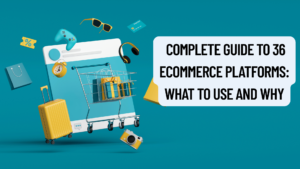In today’s digital world, selling online is not just an opportunity—it’s a necessity. Whether you’re a homepreneur, a D2C brand, or a traditional business planning to go digital, choosing the right eCommerce platform is your first strategic decision.
With over 30+ platforms available, it’s easy to feel overwhelmed. Here’s a clear guide on which platform suits what kind of business and how you can get started the smart way.

Discover how to sell online effectively. Find the best platform to grow your business with our expert guidance.
Complete Guide to 36 eCommerce Platforms: What to Use and Why
✅ 1. Amazon
Best for: General retail, branded products, FMCG, home goods Why: Huge global audience, fulfillment support (FBA), trusted marketplace
✅ 2. eBay
Best for: Refurbished items, electronics, collectibles, global resale Why: Auction-style listings, international customers, flexible pricing
✅ 3. Alibaba
Best for: B2B, wholesalers, manufacturers, exporters Why: Great for bulk sales, global sourcing, OEM/private label
🛒 4. AliExpress
Best for: Dropshippers, low-cost consumer goods Why: Resell products without inventory, global reach
5. Big Cartel
Best for: Artists, independent creators Why: Easy to set up, low-cost, personalized store
6. BigCommerce
Best for: Medium-large businesses, multi-channel brands Why: Scalable platform with enterprise features
7. Daraz
Best for: Sellers targeting South Asia (Pakistan, Bangladesh, Nepal) Why: Popular in regional markets, now owned by Alibaba
8. Ecwid
Best for: Adding eCommerce to existing websites Why: Plug-in solution for WordPress/Wix/etc.
9. Etsy
Best for: Handmade, vintage, craft, art Why: Creative community, niche buyers
10. Facebook Shop
Best for: Social selling, impulse buyers Why: Connects directly with social media ads and followers
11. JD (Jingdong)
Best for: Sellers targeting Chinese market Why: China’s major B2C retailer, logistics strength
12. Magento
Best for: Large-scale enterprise brands Why: Highly customizable but developer-intensive
13. Opencart
Best for: Developers, small-mid scale sellers Why: Free, open-source, customizable
14. OsCommerce
Best for: Tech-savvy sellers needing full control Why: Open-source, community-supported
15. Prestashop
Best for: Mid-size sellers, European market focus Why: Flexible, multilingual, open-source
16. Shopify
Best for: D2C brands, dropshippers, subscription models Why: Easy to set up, scalable, apps for everything
17. Shopware
Best for: Advanced B2C/B2B sellers in Europe Why: Strong CMS + commerce, popular in Germany
18. Sitebuilder
Best for: Beginners with small inventory Why: Easy drag-and-drop site building + store
19. Squarespace
Best for: Designers, creators, portfolio + shop Why: Beautiful templates, built-in eCommerce
20. Taobao
Best for: Selling in Chinese domestic market Why: Owned by Alibaba, C2C model, localized
21. Tiktok Shop
Best for: Trendy, viral, influencer-driven products Why: Connects product discovery and checkout on the same platform
22. Volusion
Best for: SMBs looking for an alternative to Shopify Why: Cloud-based, clean UX
23. VTEX
Best for: Large enterprises, multi-channel retailers Why: Enterprise-level SaaS eCommerce
24. Webflow
Best for: Designers wanting a website + eCommerce Why: Visual front-end builder with CMS/eCommerce
25. Wix
Best for: Small businesses, service + product mix Why: Easy to use, flexible with built-in marketing
26. WooCommerce
Best for: WordPress users, bloggers turned sellers Why: Open-source, great plugin ecosystem
27. Walmart
Best for: Sellers in the U.S., competitive with Amazon Why: Huge reach, trusted brand, low fees
28. WordPress
Best for: Content-heavy brands with eCommerce need (via WooCommerce) Why: Full flexibility for blogs + stores
29. Zazzle
Best for: Print-on-demand (POD) artists, creatives Why: Upload your designs, Zazzle handles the rest
30. Wayfair
Best for: Furniture, home décor brands Why: Access to a large buyer base, good for dropshipping furniture
31. Lazada
Best for: Southeast Asia sellers (Malaysia, Singapore, Philippines) Why: Owned by Alibaba, huge regional platform
32. Depop
Best for: Gen Z resellers, fashion & lifestyle sellers Why: Trendy second-hand fashion marketplace
33. OnBuy
Best for: UK-based sellers Why: Growing UK marketplace, lower seller fees
34. Takealot
Best for: South African eCommerce Why: Leading online retailer in South Africa
35. Printify
Best for: Print-on-demand t-shirts, mugs, merch Why: Great for designers and niche brands
36. Vinted
Best for: Second-hand fashion sellers in Europe Why: Sustainable fashion marketplace, easy to list items
Each platform caters to a specific type of product, audience, or business stage. If you’re:
- A new seller: Start with Amazon, Etsy, or Facebook Shop.
- A manufacturer or wholesaler: Try Alibaba, JD, or Taobao.
- A creative entrepreneur: Go for Zazzle, Printify, or Shopify.
- A global brand: Explore Magento, BigCommerce, or VTEX.
No one-size-fits-all. The best platform depends on your product, audience, and goals. If you’re unsure where to start or overwhelmed by registrations, compliance, and store setup—partner with someone who can help you do it right the first time.
Now you can sell online without any hassle. Our expertise will manage your complete e-store. We help you to grow your business online.


